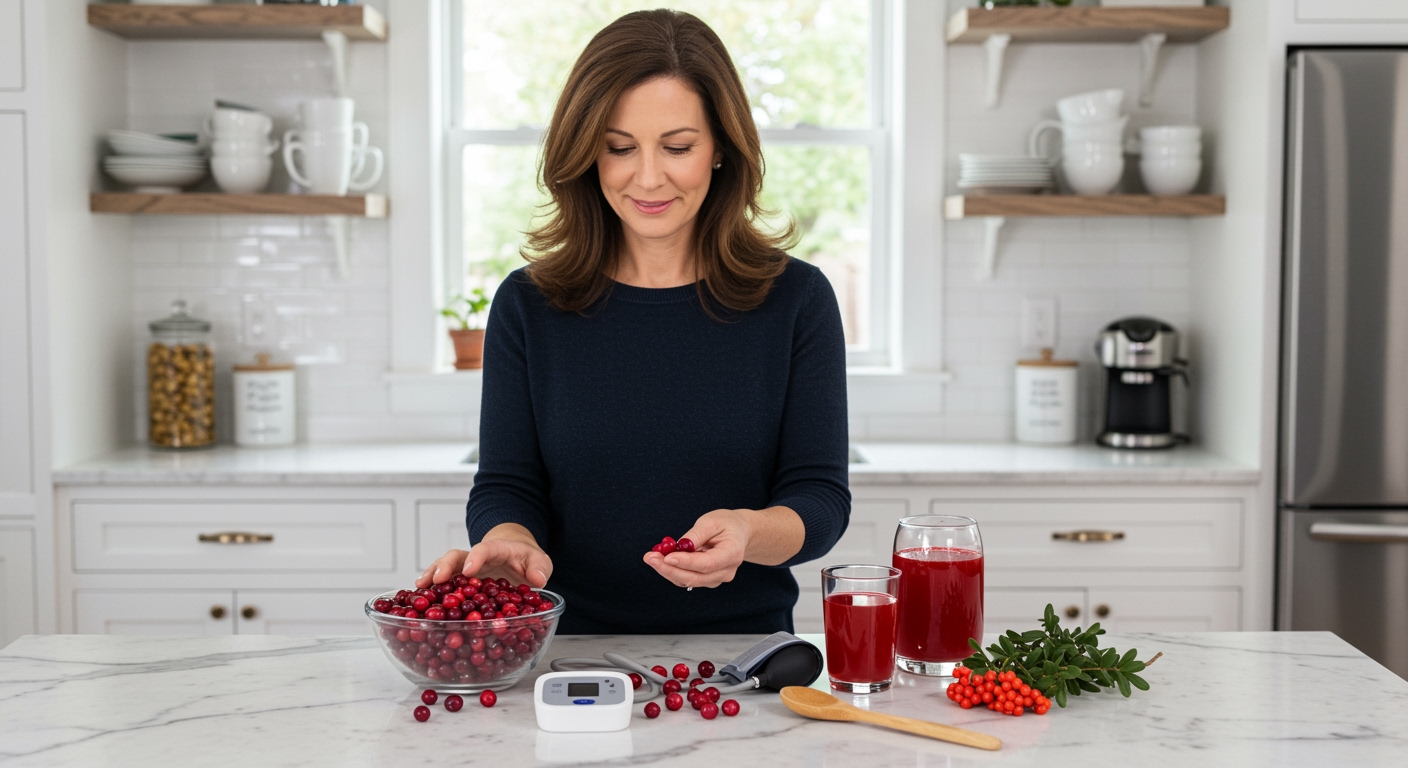✪ Key Takeaway: Cranberries may help raise low blood pressure through their natural compounds that support healthy circulation and blood vessel function.
Introduction
You grab a glass of cranberry juice thinking it might help your urinary tract, but then you wonder if it could affect your already low blood pressure.
Many people with hypotension worry about foods that might drop their blood pressure even lower, making them feel dizzy or weak throughout the day.
Hi, I’m Abdur, your nutrition coach, and today I’m going to explain how cranberries actually affect low blood pressure and whether they can be part of your daily routine.
What Makes Cranberries Special for Blood Pressure?
Cranberries contain unique compounds that work differently than most fruits when it comes to blood pressure regulation.
The main players are proanthocyanidins, which are powerful antioxidants that help your blood vessels maintain their flexibility and strength.
These compounds also support the production of nitric oxide in your blood vessels, which helps them relax and maintain proper blood flow.
Unlike some foods that can cause dramatic blood pressure drops, cranberries work more like a gentle stabilizer for your cardiovascular system.
Research shows that people who consume cranberries regularly tend to have more stable blood pressure readings over time.
✪ Fact: Cranberries contain more proanthocyanidins than most other berries, making them uniquely beneficial for blood vessel health.
How Do Cranberries Affect Low Blood Pressure?
If you have low blood pressure, cranberries might actually help normalize your readings rather than making them worse.
The key lies in how cranberries support your blood vessels’ ability to respond appropriately to different situations throughout the day.
When your blood vessels are healthier and more responsive, they can better maintain adequate pressure when you stand up or change positions.
Cranberries also help improve circulation by reducing inflammation in your blood vessels, which can contribute to better overall blood flow.
The natural sugars in cranberries provide quick energy that can help combat the fatigue often associated with hypotension.
Studies suggest that regular cranberry consumption may help reduce the frequency of dizzy spells in people with chronically low blood pressure.
✪ Pro Tip: Consume cranberries with a small amount of salt to maximize their blood pressure stabilizing effects.
What Form of Cranberries Works Best?
Fresh cranberries provide the highest concentration of beneficial compounds, but they can be quite tart to eat on their own.
Dried cranberries are more convenient but often contain added sugars that might cause blood sugar spikes followed by crashes.
Pure cranberry juice without added sugars offers a good middle ground, providing concentrated nutrients in an easily absorbed form.
Cranberry supplements can be helpful, but they vary widely in quality and potency between different brands.
For people with low blood pressure, mixing fresh or frozen cranberries into smoothies with other fruits can provide sustained energy and nutrients.
✪ Note: Avoid cranberry cocktails as they contain mostly sugar and very little actual cranberry content.
How Much Should You Consume?
A serving of about half a cup of fresh cranberries or one cup of pure cranberry juice daily appears to be the sweet spot for most people.
Starting with smaller amounts allows you to see how your body responds, especially if you have sensitive blood pressure.
Timing matters too – consuming cranberries with meals can help prevent any potential blood sugar fluctuations that might affect your pressure.
If you take blood pressure medications, monitor your readings more closely when adding cranberries to your routine.
Some people find that splitting their cranberry intake between morning and afternoon helps maintain more stable energy and blood pressure throughout the day.
Remember that consistency matters more than large amounts – regular small servings work better than occasional large doses.
✪ Pro Tip: Track your blood pressure readings for two weeks after adding cranberries to identify any patterns or changes.
The Bottom Line
Cranberries can be a helpful addition to your diet if you have low blood pressure, as they support healthy blood vessel function rather than causing dramatic pressure drops.
Small, consistent changes in your diet often create the most sustainable improvements in your health, and cranberries represent exactly this type of gentle, supportive approach to managing low blood pressure.
I would love to hear about your experience with cranberries and blood pressure – please share your questions, observations, or feedback in the comments section below.
References
At NutritionCrown, we use quality and credible sources to ensure our content is accurate and trustworthy. Below are the sources referenced in creating this article:
- PMC: Cranberry Polyphenols and Cardiovascular Health
- PubMed: Effects of Cranberry on Blood Pressure
- 120Life: Cranberries and Blood Pressure
- Medical News Today: Cranberry Health Benefits





